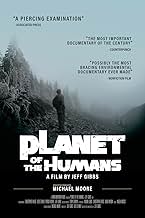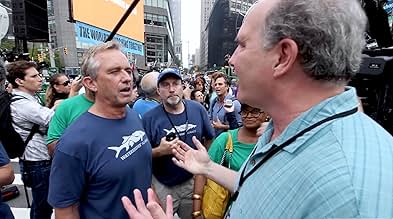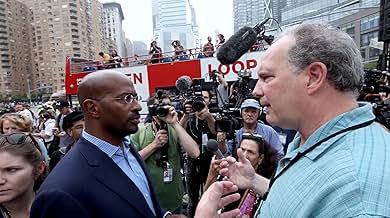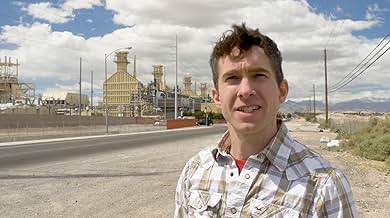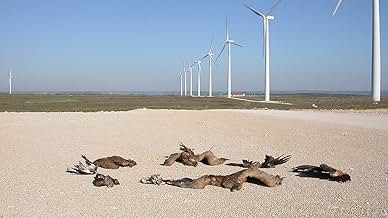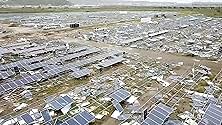Planet of the Humans
- 2019
- 1h 40min
NOTE IMDb
6,9/10
3,4 k
MA NOTE
Le film jette un regard sévère sur la façon dont le mouvement environnemental a perdu la bataille par des choix bien intentionnés mais désastreux.Le film jette un regard sévère sur la façon dont le mouvement environnemental a perdu la bataille par des choix bien intentionnés mais désastreux.Le film jette un regard sévère sur la façon dont le mouvement environnemental a perdu la bataille par des choix bien intentionnés mais désastreux.
- Réalisation
- Scénario
- Casting principal
Avis à la une
Having watched this documentary, i'll be honest it has shaken me to my core. I'm someone who is very conscious to the issues our planet is going through and the increasingly serious issue of population growth. I sometimes feel helpless in trying to figure out how I can contribute further in helping this planet survive. However, I take a bit of comfort in knowing that this film will punch some common sense and put people into action. And to open our eyes to what the real issues are. Everyone must watch this documentary to properly understand what is clearly not working so that we could determine what will work to get us out of the mess we are in. And please let your children watch because after all it is there future too.
If the raison d'être of documentaries is to stimulate debate, then I think Jeff Gibbs's Planet of the Humans is a platinum award-winning standard. Brandishing his so-called life-long green credentials early in the piece, he then cynically essentially gives the international green movement both barrels, whilst stridently asserting that renewable energy is just as bad as fossil fuels, high-profile environmentalist proponents and leaders are corrupted by corporate/financial interests and population growth is the great unspoken enemy.
At a foundation level I found one of the greatest weaknesses of Gibbs's argument is that he appears to be using pretty much out of date footage to prop up a lot of his claims and criticisms. It should be noted that by my reckoning only twice during the film are talking head pieces ever given a date stamp and they related to a couple of welcome vintage film warnings about climate change and pollution, 1958 and 1963 respectively.
So then what we find is Gibbs using 2011 footage of a wind farm protest to begin a critique of wind turbines and renewable sources of power in general. To cite another pretty obvious example; a 2010 Michigan launch of the electrically powered Chevy Volt. He criticises it (and vicariously electric cars in general) because it's recharged from a power grid in Michigan dominated by coal and meanwhile overtly seeks to gather some "gotcha moments" from unwary Chevy reps. Solar power and solar arrays in general get the Gibbs treatment too. He tours a very large solar installation in Lansing, Michigan to have an energy rep rather comically report to camera that the panels have an efficiency of a "little less than 8%" and that the array could power only about 10 city homes a year." What the film doesn't say is that the footage is from 2008.
I'm not a science/tech expert, but I would respectfully suggest that throwing the spotlight on such relatively old, out of date, renewable technology examples is an absolute eternity in terms of renewables research and development over the past decade. So on a personal level, while Gibbs is claiming in the film, solar panels are frightfully expensive, have a life of only 10 years and are only rated at 8% efficient. I contrast this with the relatively inexpensive array of 18 panels on my own roof, that have a guaranteed life of 30 years, operate without a booster and are saving me on average about 60 - 65% of my previous power bills. Go figure!
Similarly Gibbs doesn't hold back from picking up the stones to throw at environmental leaders such as Al Gore and Bill McKibben, using edited grabs to push the line that these environmental ikons have sold out to capital interests for pecuniary gain. Again though, the use of footage over a decade old is predominant and to my way of thinking, creates doubt of the validity and authenticity of the questions Gibbs raises.
Ultimately Planet of the Humans is far better at pointing fingers and listing problems, than it is at offering much in the way of solutions. Executive producer Michael Moore confirmed this when being almost brutally honest in suggesting the film sought to "ignite a discussion" on the planet's future more than anything else.
At a foundation level I found one of the greatest weaknesses of Gibbs's argument is that he appears to be using pretty much out of date footage to prop up a lot of his claims and criticisms. It should be noted that by my reckoning only twice during the film are talking head pieces ever given a date stamp and they related to a couple of welcome vintage film warnings about climate change and pollution, 1958 and 1963 respectively.
So then what we find is Gibbs using 2011 footage of a wind farm protest to begin a critique of wind turbines and renewable sources of power in general. To cite another pretty obvious example; a 2010 Michigan launch of the electrically powered Chevy Volt. He criticises it (and vicariously electric cars in general) because it's recharged from a power grid in Michigan dominated by coal and meanwhile overtly seeks to gather some "gotcha moments" from unwary Chevy reps. Solar power and solar arrays in general get the Gibbs treatment too. He tours a very large solar installation in Lansing, Michigan to have an energy rep rather comically report to camera that the panels have an efficiency of a "little less than 8%" and that the array could power only about 10 city homes a year." What the film doesn't say is that the footage is from 2008.
I'm not a science/tech expert, but I would respectfully suggest that throwing the spotlight on such relatively old, out of date, renewable technology examples is an absolute eternity in terms of renewables research and development over the past decade. So on a personal level, while Gibbs is claiming in the film, solar panels are frightfully expensive, have a life of only 10 years and are only rated at 8% efficient. I contrast this with the relatively inexpensive array of 18 panels on my own roof, that have a guaranteed life of 30 years, operate without a booster and are saving me on average about 60 - 65% of my previous power bills. Go figure!
Similarly Gibbs doesn't hold back from picking up the stones to throw at environmental leaders such as Al Gore and Bill McKibben, using edited grabs to push the line that these environmental ikons have sold out to capital interests for pecuniary gain. Again though, the use of footage over a decade old is predominant and to my way of thinking, creates doubt of the validity and authenticity of the questions Gibbs raises.
Ultimately Planet of the Humans is far better at pointing fingers and listing problems, than it is at offering much in the way of solutions. Executive producer Michael Moore confirmed this when being almost brutally honest in suggesting the film sought to "ignite a discussion" on the planet's future more than anything else.
This film has all the usual hallmarks of a Michael Moore documentary, quotes taken out of context, emotionally manipulative scenes that shock and overwhelm. Most people will come out of the movie looking for someone to blame. Al Gore? Bill McGibbon? Elon Musk? As my neighbour said tonight about the coronavirus, "I have to find someone to blame." At first I said there is no one to blame. But she doubled down. I repeated it again. But she shook her head smiling. I wanted to believe that she wasn't doubling down but just joking with me. Maybe she was. My partner says she wasn't.
I think it's important to note that the message the movie is : Our current way of life is not sustainable by any means. Now if you want to know what the movie is trying to show, it illustrates how environmentalists are in bed with the traditional fossil fuel business. Whether they are, knowingly or not, might be up for debate. It is possible that Al Gore and Bill McKibbon are stupid or naïve and want to believe that the fossil fuel businesses care. Maybe they think these businesses really want to find a sustainable alternative. Maybe they do. Maybe they are at war with their inner greed, hate, and ignorance. If we don't have someone blame, then we have to look inward, perhaps acknowledge how much we need to change, collectively. No one wants to do that. Everyone wants an easy answer that we can add to our personal narratives and belief systems.
It's not about blaming someone. It's way beyond that. Is Dennis McKenna on to something when he says that Gaia, through the SARS-COV-2, is trying to teach us something? Virologists would say, "Nonsense." We've had epidemics and pandemics before. Humankind just picks itself up, dusts itself off, and continues to gorge on the fruits of the earth with abandonment. This film is trying to warn that it is the same when it comes to the climate crisis.
I think it's important to note that the message the movie is : Our current way of life is not sustainable by any means. Now if you want to know what the movie is trying to show, it illustrates how environmentalists are in bed with the traditional fossil fuel business. Whether they are, knowingly or not, might be up for debate. It is possible that Al Gore and Bill McKibbon are stupid or naïve and want to believe that the fossil fuel businesses care. Maybe they think these businesses really want to find a sustainable alternative. Maybe they do. Maybe they are at war with their inner greed, hate, and ignorance. If we don't have someone blame, then we have to look inward, perhaps acknowledge how much we need to change, collectively. No one wants to do that. Everyone wants an easy answer that we can add to our personal narratives and belief systems.
It's not about blaming someone. It's way beyond that. Is Dennis McKenna on to something when he says that Gaia, through the SARS-COV-2, is trying to teach us something? Virologists would say, "Nonsense." We've had epidemics and pandemics before. Humankind just picks itself up, dusts itself off, and continues to gorge on the fruits of the earth with abandonment. This film is trying to warn that it is the same when it comes to the climate crisis.
I can see greenies being very upset with this documentary - but by no means is it a fossil fuels lobby piece. It's an eye-opening look at Big Green and their hidden secret that renewables like solar, wind turbines, biomass fuel and mega battery storage is actually worse for the earth that Big Coal and Big Oil. Don't be blinded in thinking that today's big renewables are actually going to save us, because they clearly aren't. The bad thing is that this documentary does not offer any solutions beyond depopulating the earth.
I'm not a tree hugger, but I do recognize the need to find renewable energy sources that are both efficient and scalable. "Planet of the Humans" outlines the planet's predicament and the environmental movement's response. But many of their efforts are ill coordinated and managed by industries that focus more on their bottom line than an overriding concern for planet earth. This is an important film, with lots of suggestions, revelations and some let's-take-a-closer-look-at-it ideas. If the environmental objective is planet preservation, then I hope we can all rally around this film's knowledge base. Not because it doesn't follow "an agenda" (because it certainly does), but because we're gonna need lots of diverse (even contrasting) perspectives - maybe even like some that are outlined here. Everyone needs to educate themselves (and be open-minded) with what works and what doesn't. And we all need to be on board this ecology train if we're gonna win this battle to save our planet (as inconvenient as that truth may be).
Le saviez-vous
- AnecdotesIt was released for free for 30 days on YouTube on the 21st of April 2020 (Earth Day 2020).
- Citations
Narrator: The takeover of the environmental movement by capitalism is now complete. Environmentalists are no longer resisting those with the profit motive, they're collaborating with them.
- ConnexionsFeatured in Outsiders: Épisode #5.14 (2020)
- Bandes originalesChilled Cream
Blank & Jones
Interpreted by Blank & Jones
Written by Piet Blank, jaspa Jones, Andy Kaufhold
Published by Soundcolours
Produced, arranged and mixed by Piet Blank, jaspa Jones, Andy Kaufhold
(C) NightsHighNoon Studio, Germany for Soundcolours GmbH & Co. KG
Licenced courtesy of Soundcolours GmbH & Co. KG, www.soundcolours.com
ISRC: DEGE91300132
Meilleurs choix
Connectez-vous pour évaluer et suivre la liste de favoris afin de recevoir des recommandations personnalisées
Détails
- Date de sortie
- Pays d’origine
- Sites officiels
- Langue
- Aussi connu sous le nom de
- Планета людей
- Lieux de tournage
- Lansing, Michigan, États-Unis(Mercantile Way: Chevy Volt exhibition, S Cedar St: solar panels, Michigan State Capitol: students rally for green energy)
- Sociétés de production
- Voir plus de crédits d'entreprise sur IMDbPro
- Durée1 heure 40 minutes
- Couleur
- Rapport de forme
- 1.78 : 1
Contribuer à cette page
Suggérer une modification ou ajouter du contenu manquant


